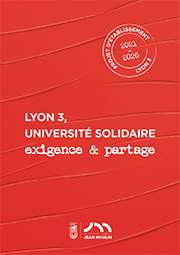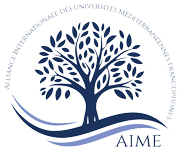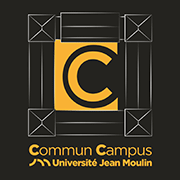AccueilRechercheProgrammes et productions scientifiquesThèsesThèses soutenuesThèses soutenues - 2024
-
Partager cette page
- Recherche,
- Philosophie,
JOURNET Simon
Essai d'une théorie du patrimoine commun de la Nation
Thèse en Droit, soutenue le 13/12/2024.
Le patrimoine commun de la Nation apparaît généralement comme une qualification symbolique. Appliquée au territoire, aux sols, à l’air, à l’eau, et, plus généralement, à l’ensemble des entités qui forment notre environnement, la notion n’aurait pour seule finalité que de justifier l’intervention de la puissance souveraine en matière environnementale, sans que le statut des choses contenues dans ce patrimoine, appropriées ou communes, ne s’en trouve changé. Couramment dénoncée, cette analyse minimaliste du patrimoine commun de la Nation tend à être dépassée pour mieux révéler le rôle clé de ce concept dans la construction du droit de l’environnement et son influence décisive sur les mutations contemporaines du droit civil. L’idée d’une théorie du patrimoine commun de la Nation est rarement avancée. Pourtant, son élaboration est aujourd’hui envisageable en repartant des règles de droit positif et des travaux doctrinaux qui s’y rapportent. Un tel système, que la présente thèse se propose de révéler, plonge ses racines dans l’interprétation des principes et des solutions applicables au patrimoine commun et au patrimoine mondial de l’humanité. La transposition de ces matériaux légués par le droit international en droit interne a pour principal effet de réifier l’environnement présent sur le territoire national. Cet environnement, perçu par le droit moderne comme un cadre abstrait d’intervention de la puissance souveraine, devient, sous l’effet de la qualification de patrimoine commun, un intérêt juridique réifié, une chose. Ce patrimoine objectif a cela de particulier qu’il se développe au sein de notre système juridique en dehors du champ des droits subjectifs en épousant plus volontiers la forme d’un patrimoine sans maître, affecté à un but de conservation et de transmission. L’affectation imposée aux immeubles qui composent notre environnement leur imprime une qualité juridique qui leur demeure inhérente et échappe au pouvoir privatif du propriétaire. L’existence de cette affectation concurrente au droit de propriété rend indispensable un retour à l’étude fondamentale de la propriétaire foncière, l’immeuble ne pouvant plus être présenté, à l’ère du patrimoine commun de la Nation, comme l’objet d’un droit exclusif et absolu. La patrimonialisation de l’environnement engendre, au plan théorique, une réduction de l’assiette de la propriété aux utilités de l’immeuble. Ce constat permet finalement d’esquisser une redéfinition du régime civil de la propriété immobilière, d’une part, en justifiant les évolutions de ses institutions traditionnelles, d’autre part, en facilitant l’intégration en son sein de multiples mécanismes issus du droit de l’environnement.
Mots-clés : Patrimoine commun de la Nation ; Environnement ; Patrimoine commun de l’humanité ; Patrimoine mondial de l’humanité ; Choses communes ; Territoire ; Souveraineté ; Domaine éminent ; Préjudice écologique ; Personnification de l’environnement ; Subjectivisation ; Immeuble ; Propriété ; Utilités de la chose ; Fonction environnementale de la propriété ; Compensation écologique ; Responsabilité
The nation's common heritage is generally seen as a symbolic term. When applied to land, soil, air, water and - more generally-speaking - to all the entities that make up our environment, the sole purpose of the concept is to justify the intervention of sovereign power in environmental matters, without changing the status of the things contained in this heritage, whether appropriated or common. While it is often criticised, this minimalist analysis of the nation’s common heritage tends to be transcended to better reveal the key role of this concept in the construction of environmental law and its decisive influence on contemporary changes in civil law. The idea of a theory of the nation's common heritage is rarely put forward. However, it is now possible to develop such a theory on the basis of the rules of positive law and related doctrinal works. Such a system, which is what this thesis aims at revealing, finds its roots in the interpretation of the principles and solutions applicable to the common heritage and the world heritage of mankind. The main effect of transposing these materials bequeathed by international law into domestic law is to reify the environment present on the national soil. This environment, perceived by modern law as an abstract framework for intervention by the sovereign power, becomes - under the effect of the qualification of common heritage - a reified legal interest, a thing. The particularity of this objective heritage is that it develops within our legal system outside the field of subjective rights, more readily taking the form of a heritage without master, assigned for the purpose of conservation and transmission. The assignment imposed on the real estate property that make up our environment imbues them with a legal quality that remains inherent to them and beyond the private power of the owner. The existence of this assignment in competition with the right of ownership makes it essential to return to the fundamental study of land ownership, since real estate property can no longer be presented, in the era of the nation's common heritage, as the object of an exclusive and absolute right. From a theoretical point of view, the patrimonialization of the environment means that the basis of ownership is reduced to the utilities of the real estate property. This observation ultimately makes it possible to outline a redefinition of the civil regime of property ownership, on the one hand, by justifying changes to its traditional institutions, and on the other hand, by facilitating the integration within it of multiple mechanisms derived from environmental law.
Keywords: Common heritage of the nation ; Environment ; Common heritage of mankind ; World heritage of mankind ; Common property ; Territory ; Sovereignty ; Eminent domain ; Ecological damage ; Personification of the environment ; Subjectivisation ; Property ; Utilities ; Environmental function of property ; Ecological offset ; Responsibility
Directeur de thèse : Frédéric ZENATI-CASTAING
Membres du jury :
- M. Florent MASSON, Professeur des universités, Université Polytechnique Hauts-de-France, Rapporteur
- M. François-Guy TREBULLE, Professeur des universités, Université Paris 1 Panthéon Sorbonne, Rapporteur
- Mme Blandine MALLET-BRICOUT, Professeure des universités en détachement, avocate générale en service extraordinaire, Cours de cassation, Paris
- Mme Judith ROCHFELD, Professeure des universités, Université Paris 1 Panthéon Sorbonne,
Présidente du jury : Blandine MALLET-BRICOUT







